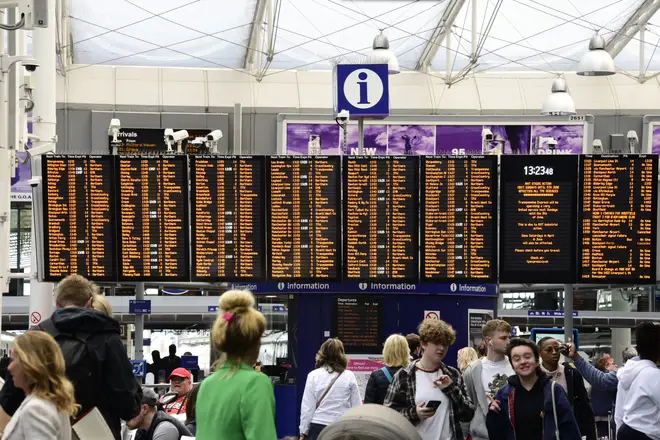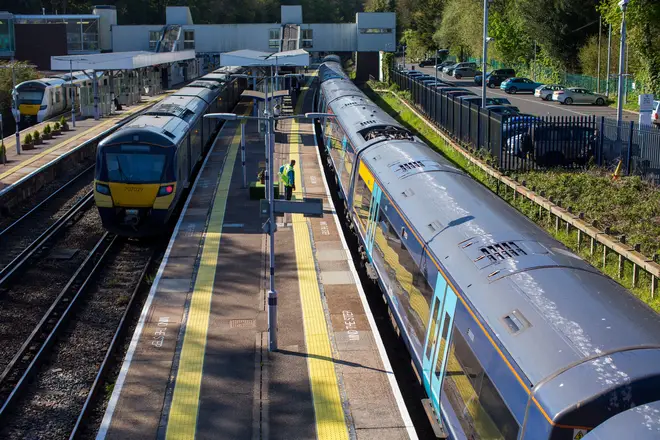
Paul Brand 10am - 12pm
21 May 2022, 08:51 | Updated: 21 May 2022, 09:09

Plans are being drawn up to try and minimise chaos on the rail network in the event of industrial action after unions warned of "potentially the biggest rail strike in modern history".
The Rail, Maritime and Transport Workers (RMT) union is balloting 40,000 members on the move, which network sources have reportedly said would create "serious challenges" in keeping goods moving and supermarket shelves stocked.
The vote, which is due to close on Tuesday, includes staff on Network Rail and 15 train operating companies, with the RMT saying the action is being taken over pay, compulsory redundancies and safety concerns.
Industrial action may begin as early as June 7.
The union has also announced it intends to ballot members in Scotland for strike action, following what it describes as a derisory" 2.2% pay offer by ScotRail and proposed timetable changes which it branded a "kick in the teeth" to workers.
Read more: Grocery prices 'up 20 per cent in two years' and shoppers offered fewer discounts
Read more: Monkeypox outbreak linked to superspreader event at adult sauna
Another union, the Transport Salaried Staffs' Association (TSSA), has warned of a "summer of discontent" with similar action on the way unless pay disputes are resolved.
TSSA general secretary Manuel Cortes has said many members have not seen a wage increase for two years.
"If the Department for Transport, Train Operating Companies and Network Rail don't come forward very soon with proposed pay increases, which at least match inflation, a summer of discontent is on the way across our railways," Mr Cortes said.

Transport Secretary Grant Shapps will meet with the Prime Minister and Chancellor next week to discuss the threat amid fears in Whitehall that the action could be worse than the junior doctor walkout in 2015, The Times has reported.
Specific details about the action have not yet been outlined by the RMT.
But rail bosses could respond by reserving certain times of day exclusively for the passing of freight trains, according to the paper.
A senior rail source is quoted by the paper as saying: "We want to keep people and goods moving but there is no doubt we face serious challenges.
"There is an awful lot of work going on behind the scenes including around what the timetable might look like. One option is times of the day when only freight services operate."
The Rail Delivery Group (RDG) has urged against what it describes as a "premature" ballot but said it was drawing up contingency plans to try and lessen the effects of any potential strike.
A RDG spokesperson said: "The pandemic was an unprecedented shock for the railway, we now need to adapt to new travel patterns while taking no more than our fair share from the taxpayer. Nobody wins when rail is disrupted.
"The RMT leadership should put an end to this damaging uncertainty by abandoning their premature ballot but like any responsible industry we are contingency planning to minimise the impact of potential strike action on the economy and to keep goods and passengers moving this summer."
RMT general secretary Mick Lynch said: "Railway workers have had to contend with pay freezes, the prospect of losing their jobs and repeated attacks on their terms and conditions.
"Removing 2,500 safety-critical jobs from Network Rail will spell disaster for the public, make accidents more likely and will increase the possibility of trains flying off the tracks.
"Train operating companies have praised our members for being key workers during the pandemic but have refused to keep staff pay in line with inflation and soaring living costs.
"As a result, thousands of railway workers have seen their living standards plummet and have run out of patience.
"The way for trade unions to effectively take on the cost-of-living crisis is to stand up for their members at work and take industrial action when employers are not moved by the force of reasoned argument.
"A national rail strike will bring the country to a standstill, but our members' livelihoods and passenger safety are our priorities."
He added: "We believe in modernising the railways but we do not believe in sacrificing thousands of jobs, constant pay freezes or making the railways unsafe.
"That is what government plans will mean for the railways if RMT and other transport unions don't mount a comprehensive defence of the industry."
The ballot will be among RMT members on Network Rail and Chiltern Railways, Cross Country Trains, Greater Anglia, LNER, East Midlands Railway, c2c, Great Western Railway, Northern Trains, South Eastern Railway, South Western Railway, Island Line, GTR (including Gatwick Express), Transpennine Express, Avanti West Coast, and West Midlands Trains. It closes on Tuesday and the results will be known the following day at 10am.
Tim Shoveller, Network Rail's regional director, said: "We are disappointed that the RMT has taken this decision and urge them again to work with us, not against us, as we build an affordable railway fit for the future."
Mr Shoveller added: "We would not consider any changes that would make the railway less safe."
The Department for Transport has been contacted for comment.